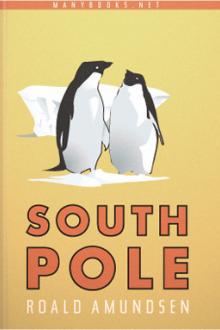The South Pole by Roald Amundsen (pride and prejudice read txt) 📕

- Author: Roald Amundsen
- Performer: -
Book online «The South Pole by Roald Amundsen (pride and prejudice read txt) 📕». Author Roald Amundsen
st of Illustrations
Roald Amundsen Approximate Bird's-eye View, Drawn from the First Telegraphic Account Reproduced by permission of the Daily Chronicle The Opening of Roald Amundsen's Manuscript Helmer Hanssen, Ice Pilot, a Member of the Polar Party The "Fram's" Pigsty The Pig's Toilet Hoisting the Flag A Patient Some Members of the Expedition Sverre Hassel Oscar Wisting In the North-east Trades In the Rigging Taking an Observation Ronne Felt Safer when the Dogs were Muzzled Starboard Watch on the Bridge Olav Bjaaland, a Member of the Polar Party 136 In the Absence of Lady Partners, Ronne Takes a Turn with the Dogs An Albatross In Warmer Regions A Fresh Breeze in the West Wind Belt The Propeller Lifted in the Westerlies The "Fram's" Saloon Decorated for Christmas Eve Ronne at a Sailor's Job The "Fram" In Drift-ice Drift-ice in Ross Sea A Clever Method of Landing The "Fram" under Sail Cape Man's Head on the Barrier Seal-hunting The "Fram" The Crew of the "Fram" in the Bay of Whales The "Fram" in the Ba





Comments (0)